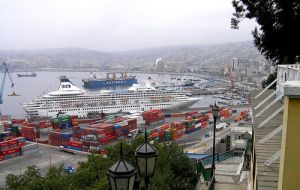MercoPress. South Atlantic News Agency
Chilean ports system lacking for booming cruise industry
 Valparaiso port - Chile
Valparaiso port - Chile With more than 400.000 tourists passing through Chile's ports in 2007 and an expected 12% growth this year, there is no doubt that cruise trips are gaining popularity in South America. Chile, along with Brazil and Argentina (the ABC triangle) is one of the leading providers of cruises through the southern tip of South America.
The number of Chilean cruise passengers is on the rise, too, with experts anticipating that at least 20,000 Chileans will board cruisers during their vacations this year. Passengers cite not having to pay high hotel and transportation fees - along with the convenience of not having to move luggage or check in and out multiple times - as reasons for choosing cruises over more traditional forms of travel. Government officials report that more than 800 million US dollars and almost 200,000 jobs were generated in 2007 from tourism. While the growth in cruiser tourism is great for the local economy, Chile's ports are not prepared to accommodate the large numbers of tourists. "Chile needs to grow, and while some have started to offer new services to tourists, it's still not enough," said Víctor Venegas, manager of Cruises and Incentives of DMC, a company that caters to about 70% of the cruise passengers. "There's usually a scarcity of services provided to cruise passengers in Chile". Many ports across the world boast terminals with amenities similar to those of an airport, while Chilean ports are smaller and lacking many of the services that facilitate the cruise process and that many tourists find appealing. Part of the problem is that the short cruise season does not give much incentive for further investment into the improvement of Chile's ports. "Investments will improve the conditions of the ports, making Chilean ports more attractive to cruise companies and tourists alike," said Bárbara Urzúa, director of Discover The World Marketing, which represents cruise lines such as Royal Caribbean, Celebrity and Crystal. But these terminal offices are not the only problem. There is friction between the cruise companies and the ports when it comes to coordinating the arrival and departure of the ships. According to Teodor Wigodsky, president of the Southern Cone Port Corporation, cruise companies are asked to inform the ports of their arrival details in advance to ensure quality of service and facilitate logistics. But this is not the case, according to Urzúa, who says that the ports do not receive information on other companies' ships, which makes the embarking process very difficult. "We're missing the coordination that exists in other countries," she said. The Santiago Times




Top Comments
Disclaimer & comment rulesCommenting for this story is now closed.
If you have a Facebook account, become a fan and comment on our Facebook Page!